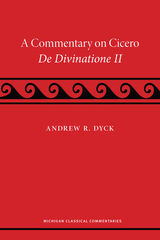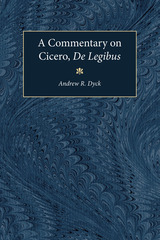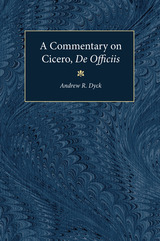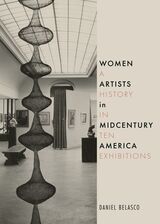
Celia Schultz’s earlier volume in this series presented the text and commentary for De Divinatione I. With Andrew Dyck’s companion volume on the second book of De Divinatione, students and teachers are well served with crucial texts from one of Rome’s most famous philosophers, as he considers important Roman practices and beliefs.

Surprisingly, de Legibus has been one of Cicero's most neglected works. Andrew R. Dyck's commentary is the first to appear on the complete work in well over one hundred years. Dyck provides a detailed interpretation and sets the essay into the context of the politics and philosophical thought of its time. While previous commentaries focused primarily on grammar and textual criticism, this one also seeks to relate Cicero's text to the political, philosophical, and religious trends of his day. The author identifies the influences on Cicero's thinking and analyzes the relation of this theoretical treatise to his other works. This commentary is based on a new text, worked out in consultations between the author and Jonathan Powell of Royal Holloway, London.
Andrew Dyck is Professor of Classics, University of California at Los Angeles.

Composed in haste shortly before Cicero's death, de Officiis has exercised enormous influence over the centuries. It is all the more surprising that Andrew R. Dyck's volume is the first detailed English commentary on the work written in this century. It deals with the problems of the Latin text (taking account of Michael Winterbottom's new edition), it delineates the work's structure and sometimes elusive train of thought, clarifies the underlying Greek and Latin concepts, and provides starting points for approaching the philosophical and historical problems that de Officiis raises.
A work of major importance for classicists, philosophers, and ancient historians, this Commentary will be an invaluable companion to all readers of Cicero's last philosophical work.
Andrew R. Dyck is Professor of Classics, University of California, Los Angeles.
Publication of this volume is supported by a grant from the National Endowment for the Humanities.

Incomplete but invaluable excerpts from otherwise lost orations.
Cicero (Marcus Tullius, 106–43 BC), Roman advocate, orator, politician, poet, and philosopher, about whom we know more than we do of any other Roman, lived through the stirring era that saw the rise, dictatorship, and death of Julius Caesar in a tottering republic. In Cicero’s political speeches and in his correspondence, we see the excitement, tension, and intrigue of politics and the important part he played in the turmoil of the time.
Although Cicero’s oratory is well attested—of 106 known speeches, fifty-eight survive intact or in large part—the sixteen speeches that survive only in quotations nevertheless fill gaps in our knowledge. These speeches attracted the interest of later authors, particularly Asconius and Quintilian, for their exemplary content, oratorical strategies, or use of language, failing to survive entire not because they were inferior in quality or interest but due to factors contingent on the way Cicero’s speeches were read, circulated, and evaluated in (especially late) antiquity.
The fragmentary speeches fall, like Cicero’s career in general, into three periods: the preconsular, the consular, and the postconsular, and here are presented chronologically, numbered continuously, and their fragments arranged, insofar as possible, in the order in which they would have occurred, followed by unplaced quotations. Each speech receives an introduction and ample notation.
This edition, which completes the Loeb Classical Library edition of Cicero, includes all speeches with attested fragments, together with testimonia. Based upon Crawford’s edition of 1994, the sources have been examined afresh, and newer source-editions substituted where appropriate.

An Open Letters Review Best Book of the Year
Angelo Poliziano (1454–1494) was one of the great scholar-poets of the Italian Renaissance and the leading literary figure of Florence in the age of Lorenzo de’ Medici, “il Magnifico.” The poet’s Miscellanies, including a “first century” published in 1489 and a “second century” unfinished at his death, constitute the most innovative contribution to classical philology of the Renaissance. Each chapter is a mini-essay on some lexical or textual problem which Poliziano, drawing on the riches of the Medici Library and Lorenzo’s collection of antiquities, solves with his characteristic mixture of deep learning, analytic skill, and brash criticism of his predecessors. Volume 1 presents a new Latin edition of The First Century of the Miscellanies, and these volumes together present the first translation of both collections into any modern language.

An Open Letters Review Best Book of the Year
Angelo Poliziano (1454–1494) was one of the great scholar-poets of the Italian Renaissance and the leading literary figure of Florence in the age of Lorenzo de’ Medici, “il Magnifico.” The poet’s Miscellanies, including a “first century” published in 1489 and a “second century” unfinished at his death, constitute the most innovative contribution to classical philology of the Renaissance. Each chapter is a mini-essay on some lexical or textual problem which Poliziano, drawing on the riches of the Medici Library and Lorenzo’s collection of antiquities, solves with his characteristic mixture of deep learning, analytic skill, and brash criticism of his predecessors. Volume 1 presents a new Latin edition of The First Century of the Miscellanies, and these volumes together present the first translation of both collections into any modern language.
READERS
Browse our collection.
PUBLISHERS
See BiblioVault's publisher services.
STUDENT SERVICES
Files for college accessibility offices.
UChicago Accessibility Resources
home | accessibility | search | about | contact us
BiblioVault ® 2001 - 2024
The University of Chicago Press









